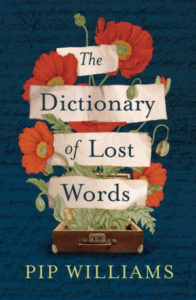Book Review
The Dictionary of Lost Words
Rating:

Being a word person, I was drawn to this book, The Dictionary of Lost Words by Pip Williams. It tells of the making of the Oxford-English Dictionary through the eyes of a fictitious young girl whose dad is one of the scholars tasked with the job. Motherless, Esme spends her childhood under the sorting table at the Scriptorium, a big word there for a small shed where the work of gathering and sorting the little slips of paper on which, in the late 1800s and early 1900s, words and their various meanings were collected, was done.
Discussing words with her father becomes her main childhood activity. And then there are the words that slip (or are pushed) off the table and fall to the floor. With no one watching, Esme collects these little pieces of paper and tucks them away in a trunk, forming the basis of her “dictionary of lost words.”
Lo and behold, there is a pattern to these “lost” words. Most of them deal with women’s issues that are of no meaning – or worth – to the men compiling their dictionary. They do have meaning for Esme, who goes on to shape her life by finding other women’s words.
Intricately researched to capture the actual process of compiling that first comprehensive Oxford English Dictionary, THE DICTIONARY OF LOST WORDS is in many ways a feminist novel. Nothing in your face, it simply tells of the struggles of women to be heard in the years leading up to the suffragette movement.
But we aren’t only talking about the early 1900s. Whether or not the author intended it, many of the points in this book apply to today’s struggles for women’s freedom and voting rights.
One caveat. I wasn’t wild about the ending. After being fully invested in Esme, I found it abrupt. And while I do understand, from a writer’s perspective, why the author did what she did, the reader in me was let down.
That said, particularly after listening to the author’s comments, I understand that the characters were, for her, a vehicle to tell the origins of the Oxford English Dictionary. She took something that might have been dry and gave it life. When I focus on that, I do love this book.
I listened to it – an excellent narration – and highly recommend it in any format.